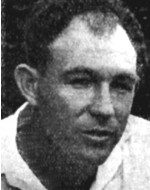Son of Yocheved-Mina (a well-known writer in the Vienna newspapers in those days) and Dr. David (a pediatrician, of the few Zionists in Hungary, president of the community in western Budapest), was born on 9.7.1914 in Budapest, the capital of Hungary. 1922 immigrated to Israel with his parents and sisters, wandered with them to his father’s workplaces (in the Old City of Jerusalem and to the Hadassah hospitals in Safed, Haifa and Tel Aviv) and studied in the preparatory high school in Haifa and the Tachkemoni religious school in Tel Aviv He was not diligent, but the studies seemed to cling to him, and the bar mitzvah was received by a friend of the family, the national poet HN Bialik, a Bible with a dedication in his handwriting. He went to Israel to study agriculture at the Mikveh Israel Agricultural School, where he joined the founders of the Ken at the age of 15, Hashomer Hatza’ir, and after his three years of study, he was one of the founders and leaders of the first Hashomer Hatzair movement in Palestine. Later, when the nuclear reactor was located on the Turkish Highway north of Ramat Gan, he worked in citrus orchards, cartwheels, block industry and the kitchen, and at the same time was a cultural activist and participated in shaping the image of the kibbutz society. He always demanded to immigrate to the permanent settlement and connect the kibbutz to a certain piece of land, and once even suggested that his friends go up to the abandoned ditches. When his kibbutz was destined to settle on the eastern edge of the Jezreel Valley, he was sent there among the first. He worked in digging the canal from Beit Alfa and digging the pits to the electricity poles, and was astonished at his great productivity, and eventually established the Tel Amal farm (Nir David) with his friends. He showed agility and talent in assembling a tractor and operating it, and tended to plow a tractor on the lands of the Beit Shean Valley. Every job in the farm-in the cowshed, in the field and even in the garbage pit-was important to him. Under his usual educating influence, the members to arrange even small daily matters. In Tel Amal there was a belief that what Emmanuel must have assumed would be perfect. He struggled with himself and controlled the demands of kibbutz life for his personal inclinations. He liked the children and liked them especially since his son and daughter were also added to the small crowd. Under his hard skin, he was exposed to his friends as a man of good humor and humor, a man of culture and knowledge of the book, editor of the kibbutz leaflet and lecturer in Bible lessons with love and knowledge, respectful parents and helping friends overcome problems and difficulties at work. In practice, the JNF provided the land it had acquired in the Beit Shean Valley, successfully served as a field guard, came into contact with the neighbors, and instructed the settlers to protect the boundaries of the land and contact with the Arabs, who knew him and respected him as “Sheikh Twail.” And to exercise strict caution while maintaining strict Jewish property and honor He joined the Haganah in 1932. During the 1936-1939 riots, he enlisted in the Guard Corps and served as a field guard in the Beit Shean Valley and was responsible for the security of the “Tower and Stockade” settlements. He completed the courses of commanders and commanders and taught in the course for commanders. In 1947, he volunteered for the Palmach and served as instructor in a national course for commanders. In May 1948, he was transferred to the Golani Brigade as a company commander and reached the rank of captain and deputy battalion commander. Here, too, his main qualities were revealed: exemplary order and cleanliness, courage, rootedness and thoroughness. At the head of his company he participated in the occupation of Kaukab al-Hu, Zar’in, MazaIn the battles of Jenin, and during the retreat he remained in the cendella, and only after he had rescued a company from the battalion that remained in the Mukibla at night did he retreat. Then he participated in the conquest of Nazareth and more. In his service, he took care of his people, encouraged the backward and helped the weak and gave them a spirit of life and will. In December 1948 he went down with the brigade to the Negev, and during the quiet days between the battles, he traveled extensively and pondered the agricultural future of the area. In Operation Horev, the expulsion of the Egyptian army from Israel, the Golani Brigade was tasked with creating a deception in the western wing of the front, before the main effort in the eastern wing began. On the night of December 22-23, 1948, the brigade captured the 86th post north of Khan Younis, threatening the road and the railroad, and gave the impression that the intention was to cut off the Egyptian forces in the Gaza Strip. The Egyptians reacted with a fierce counter-attack with the help of artillery and armor, and under enemy pressure the Golani fighters were forced to retreat. In the course of the battle, Commander Emanuel boomed over the space: “Our battalion has not retreated!” “Do not retreat, attack bayonets!” And indeed the men held out almost to the last ball. In the heat of the battle, Emanuel felt the help of a wounded soldier and raised him to remove him on his shoulders from the firing range, and as a result he was hit by shrapnel and fell on the morning of the 21st of December, 1948. On the 13th of Tevet 5708 (13.1.1949) Emanuel was brought to eternal rest in the cemetery at Tel Amal. In his memory, the kibbutz published the booklet “Emmanuel Berashi of Tel Amal”.
